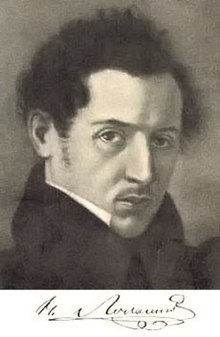Nikolai Ivanovich Lobachevsky
Russian mathematician (1792–1856)
Nikolai Ivanovich Lobachevsky (Никола́й Ива́нович Лобаче́вский) (December 1, 1792 – February 24, 1856, N.S.; November 20, 1792 – February 12, 1856, O.S.) was a Russian mathematician.

| This article about a mathematician is a stub. You can help out with Wikiquote by expanding it! |
Quotes
edit- There is no branch of mathematics, however abstract, which may not some day be applied to phenomena of the real world.
- As quoted in George Edward Martin, The Foundations of Geometry and the Non-Euclidean Plane, Springer (1998 [1975]), p. 225; also in Stanley Gudder, A Mathematical Journey, McGraw-Hill (1976), p. 36.
- You must not attempt this approach to parallels. I know this way to its very end. I have traversed this bottomless night, which extinguished all light and joy from my life. I entreat you, leave the science of parallels alone…I thought I would sacrifice myself for the sake of the truth. I was ready to become a martyr who would remove the flaw from geometry and return it purified to mankind. I accomplished monstrous, enormous labours; my creations are far better than those of others and yet I have not achieved complete satisfaction. For here it is true that si paullum a summo discessit, vergit ad imum. I turned back when I saw that no man can reach the bottom of this night. I turned back unconsoled, pitying myself and all mankind… I have travelled past all reefs of this infernal Dead Sea and have always come back with broken mast and torn sail. The ruin of my disposition and my fall date back to this time. I thoughtlessly risked my life and happiness — aut Caesar aut nihil. ["Emperor or nothing"]
- Letter from his father, on April 4, 1820.
- My dear Father! Now I cannot say anything else; from nothing I have created a new different world. All other things that I have sent to you are just a house of cards compared to a tower. I am determined to publish a work on parallels as soon as having arranged and prepared it.
- Letter to his father, 1823
Quotes about him
edit- Lobachevski had to teach Geometry; and began by an intensive critical study of Euclid, acting as devil's advocate. This approach to the anomalous parallel axiom resulted in his non-Euclidean Geometry.
- John Littlewood, Littlewood's Miscellany, p. 193.